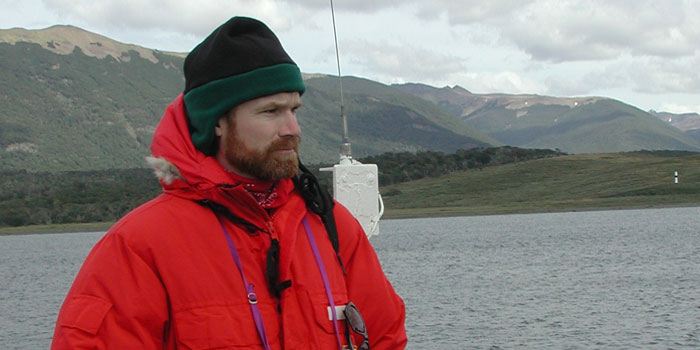You can hear more from Dr. Keller and his journey to become a geochemist here.

About the Job
What is your title?
Assistant Professor. Most university faculty start out as an assistant professors and work their way up to associate professors after five to six years and eventually to full professors.
Where do you work?
Oregon State University in Corvallis, Oregon.
Do you travel often?
Yes, once a month or so for scientific conferences, fieldwork, research cruises, and even an occasional vacation. Geology and oceanography are very international sciences. There is so much to learn from colleagues in other countries that I wish I could go to more scientific conferences to see what others are doing, but there is not enough time or money to go to every conference. I have been to every continent, camped out for two months at a time in Antarctica, and lived in Poland for a year and a half working with some colleagues there on volcanic rocks from Antarctica.
What are the educational requirements for your job?
A Ph.D. in geology, oceanography, or some related field is usually required for a university faculty position. That takes five years or more of graduate school, by which time you have either burned out or become addicted to posing and solving your own scientific questions. Many people go to graduate school in oceanography after majoring in chemistry or physics or biology, they just apply their skills to the ocean.
What is the salary range for someone with your type of job?
The salary range is $40,000–$60,000 to start, and higher for associate professors and full professors who have been in the job for a while.
How many hours do you work per week?
I work 50–60 hours per week depending on deadlines and if I am teaching a class. That may sound like a lot, but I almost always have the freedom to choose the exact times I work. For example, I often have to work straight through a weekend to get a big project finished on time, but then I can take a couple of days off to recover if I want to. Or I can take an afternoon off if the weather is nice, but then I usually have to work late that night to catch up again. The working hours on research cruises can be pretty brutal; 12–18 hour days are typical, and sometimes it can get so busy that there is no time to sleep at all for a day or two.
Job Duties
Tell us about your research and the types of things you do.
I specialize in the chemical composition of volcanic rocks because rock chemistry can tell you how explosive a volcano is, how old it is, how deep the lava came from, and what that lava encountered on its way to the surface. So when I go out on a ship or hike up a mountain to collect samples, I am only beginning my studies of an area. Many of the key answers come later when I return to the laboratories at my university and grind, dissolve, and melt the rocks to determine their chemical makeup. Many geologists live close to where they do their fieldwork, but I do not because I work mostly in the North Pacific Ocean and Antarctica, so I often have to leave home for one or two months to go out on a ship or fly to a research station in Antarctica.
What is the most fascinating thing you have ever seen or done?
This is probably a toss up between watching bioluminescent organisms streak by the window in Alvin while descending through the deep dark ocean and watching lava flow down a hillside in Hawaii and then cool into solid rock before my eyes.
What are the personal rewards of your work?
Asking and answering my own questions about what shapes the Earth, what is found on the seafloor, and what we can learn about the history of a volcano from picking apart the clues left behind in the rocks.
How does your work benefit the public?
With a better understanding of volcanic eruptions, I think we can reduce the hazards created by volcanoes and also how volcanoes can affect our weather and climate. Underwater volcanoes, even the inactive ones, provide important habitats for a variety of marine life. One of the most interesting things to me about our seamount exploration cruises to the Gulf of Alaska is the way many types of marine organisms seem to prefer rocky instead of muddy areas of the seafloor, so even they care about the geology.
What else could someone with your background do?
Work as a consulting geologist on volcanic hazards, in environmental chemistry tackling issues such as mining pollution and groundwater safety, or as an interpreter at a national park with cool geology (Yellowstone or Grand Canyon, for example).

